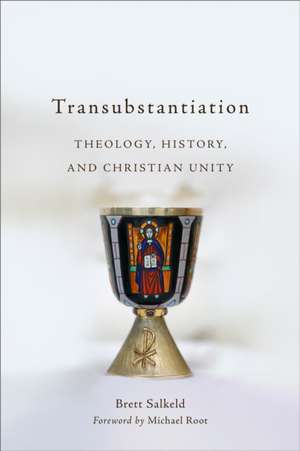Transubstantiation – Theology, History, and Christian Unity
Autor Brett Salkeld, Michael Rooten Limba Engleză Paperback – 18 noi 2019
"This is an important book on a sensitive topic. It offers a fresh approach to a seemingly intractable problem in ecumenical relations and is well researched and judicious in its judgments. It will be a significant new resource for ecumenical dialogue."
--John Cavadini, McGrath Institute for Church Life, University of Notre Dame
"It is a great scandal that the Eucharist, the sacrament of Christian unity, has been the occasion for fracture and division in the body of Christ. At the heart of many of the controversies has been the Catholic doctrine of transubstantiation. Salkeld's book is the best ecumenical study of this topic to appear in years. He asks Catholics to consider what the Church actually teaches on the subject, and invites Protestants to wonder if their own eucharistic doctrines aren't in fact closer to transubstantiation than they've been led to believe. Agree with Salkeld or not, his book is a model of charitable and intelligent ecumenical theology."
--Joseph Mangina, Wycliffe College, Toronto School of Theology
"I learned so much from this book. Salkeld boldly touches the third rail of ecumenism: the doctrine of transubstantiation, the very mention of which is bound to raise the hackles of both Protestants and (increasingly since Vatican II) Catholics. He defends the startling suggestion that Lutherans, Reformed, and Catholics can find in a proper understanding of 'transubstantiation' the position on real presence that each yearns to uphold. Salkeld writes with love and admiration for his fellow Christians. May this wonderful book enrich Christian unity as we approach the mysteries of the Lord's table."
--Matthew Levering, Mundelein Seminary
"In December chill the laborer hastens home at dusk to the hearth. So Salkeld's work in this time of 'ecumenical winter' warms the reader with the glow of ecumenically intentional dogmatics. If Protestants still wish to douse the fire with a bucket of cold water to the effect that Rome has never heard the witness of the Reformation, Salkeld's careful and sympathetic reading of sixteenth-century eucharistic theology, like Elijah's fire on Mount Carmel, vaporizes the objection."
--Paul R. Hinlicky, Roanoke College; Evanjelická Bohoslovecká Fakulta, Univerzita Komenského, Bratislava, Slovakia
"An extraordinary book. . . . An appeal for an ecumenical Thomism that is sensitive, well-researched, and compellingly presented."--Joshua Mobley, Modern Theology
"Remarkable for its ambitious and intriguing ecumenical proposals."--John Sehorn, Faith & Culture
"Salkeld shows that if Christian churches were to spend more time relearning their theologies of conversion by returning to their sources, the Eucharist could become a new locus of ecumenical convergence."--David Grumett, Ecclesiology
"This book is most valuable for its careful, ecumenically sensitive treatment of Thomas's theory of transubstantiation and a thoughtful appraisal of the core issues important to Luther and Calvin."--Kimberly Hope Belcher, Theological Studies
"Deserves a place on one's bookshelf."--Justin D. Kane, Concordia Theological Quarterly
"An excellent contribution to ecumenical discussions between Catholics and Protestants on the Eucharist."--Matthew Kemp, Reading Religion
Preț: 167.44 lei
Nou
Puncte Express: 251
Preț estimativ în valută:
32.04€ • 34.26$ • 26.71£
32.04€ • 34.26$ • 26.71£
Carte disponibilă
Livrare economică 27 martie-10 aprilie
Livrare express 12-18 martie pentru 26.94 lei
Preluare comenzi: 021 569.72.76
Specificații
ISBN-13: 9781540960559
ISBN-10: 1540960552
Pagini: 288
Dimensiuni: 163 x 235 x 20 mm
Greutate: 0.39 kg
Editura: Baker Publishing Group – Baker Books
ISBN-10: 1540960552
Pagini: 288
Dimensiuni: 163 x 235 x 20 mm
Greutate: 0.39 kg
Editura: Baker Publishing Group – Baker Books
Notă biografică
Descriere
This thoroughgoing study of the doctrine of transubstantiation explores eucharistic presence in the theologies of Aquinas, Luther, and Calvin, showing that Christians might have more in common on this topic than they have typically been led to believe.
